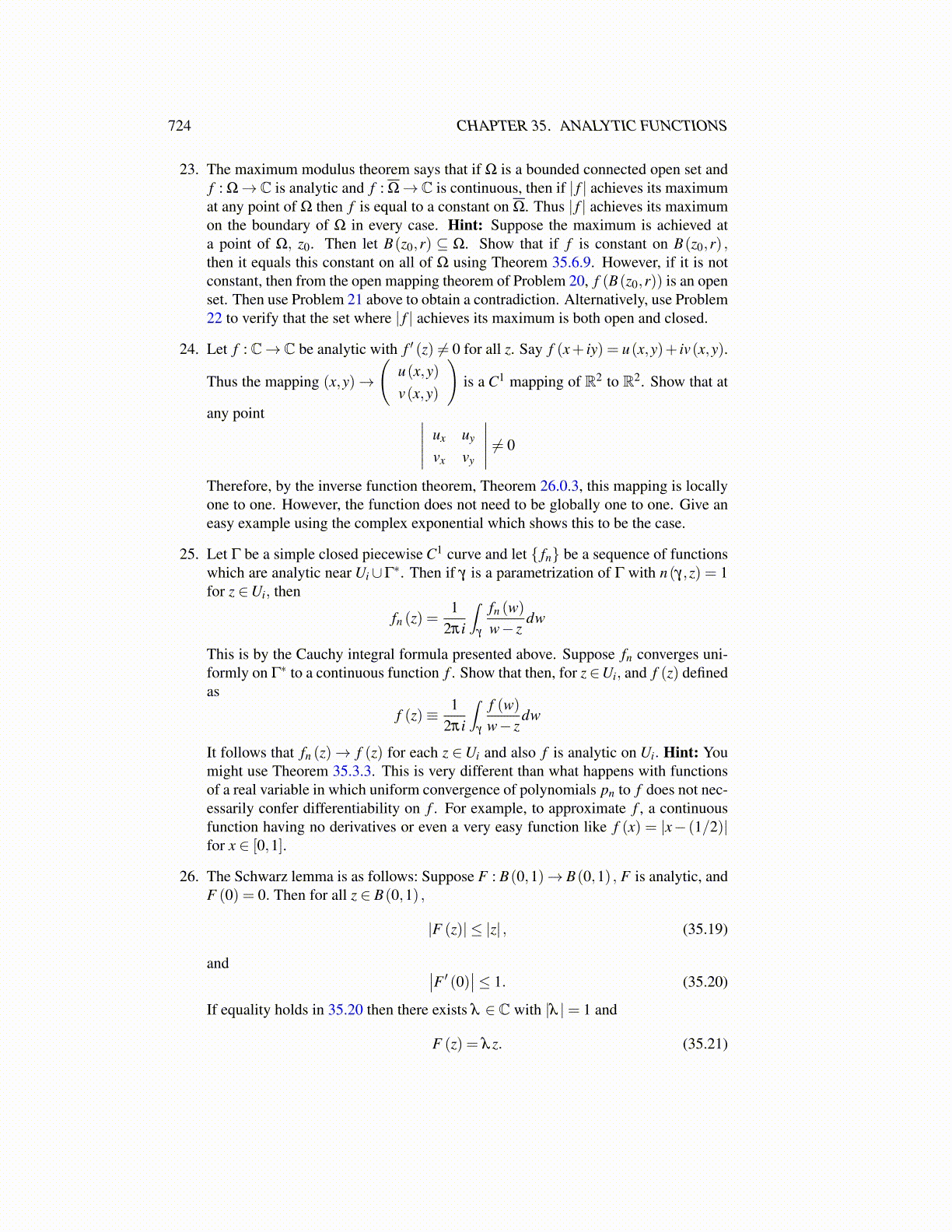
724 CHAPTER 35. ANALYTIC FUNCTIONS
23. The maximum modulus theorem says that if Ω is a bounded connected open set andf : Ω→C is analytic and f : Ω→C is continuous, then if | f | achieves its maximumat any point of Ω then f is equal to a constant on Ω. Thus | f | achieves its maximumon the boundary of Ω in every case. Hint: Suppose the maximum is achieved ata point of Ω, z0. Then let B(z0,r) ⊆ Ω. Show that if f is constant on B(z0,r) ,then it equals this constant on all of Ω using Theorem 35.6.9. However, if it is notconstant, then from the open mapping theorem of Problem 20, f (B(z0,r)) is an openset. Then use Problem 21 above to obtain a contradiction. Alternatively, use Problem22 to verify that the set where | f | achieves its maximum is both open and closed.
24. Let f : C→C be analytic with f ′ (z) ̸= 0 for all z. Say f (x+ iy) = u(x,y)+ iv(x,y).
Thus the mapping (x,y)→
(u(x,y)v(x,y)
)is a C1 mapping of R2 to R2. Show that at
any point ∣∣∣∣∣ ux uy
vx vy
∣∣∣∣∣ ̸= 0
Therefore, by the inverse function theorem, Theorem 26.0.3, this mapping is locallyone to one. However, the function does not need to be globally one to one. Give aneasy example using the complex exponential which shows this to be the case.
25. Let Γ be a simple closed piecewise C1 curve and let { fn} be a sequence of functionswhich are analytic near Ui∪Γ∗. Then if γ is a parametrization of Γ with n(γ,z) = 1for z ∈Ui, then
fn (z) =1
2πi
∫γ
fn (w)w− z
dw
This is by the Cauchy integral formula presented above. Suppose fn converges uni-formly on Γ∗ to a continuous function f . Show that then, for z∈Ui, and f (z) definedas
f (z)≡ 12πi
∫γ
f (w)w− z
dw
It follows that fn (z)→ f (z) for each z ∈Ui and also f is analytic on Ui. Hint: Youmight use Theorem 35.3.3. This is very different than what happens with functionsof a real variable in which uniform convergence of polynomials pn to f does not nec-essarily confer differentiability on f . For example, to approximate f , a continuousfunction having no derivatives or even a very easy function like f (x) = |x− (1/2)|for x ∈ [0,1].
26. The Schwarz lemma is as follows: Suppose F : B(0,1)→ B(0,1) , F is analytic, andF (0) = 0. Then for all z ∈ B(0,1) ,
|F (z)| ≤ |z| , (35.19)
and ∣∣F ′ (0)∣∣≤ 1. (35.20)
If equality holds in 35.20 then there exists λ ∈ C with |λ |= 1 and
F (z) = λ z. (35.21)